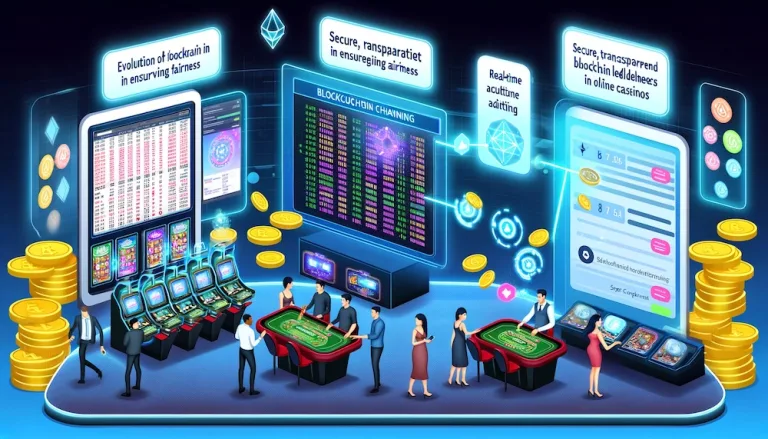Blockchain technology is revolutionizing the online casino industry by enhancing fairness through transparent and tamper-proof gaming environments. This innovative technology ensures that game outcomes are fair and verifiable, fostering trust between players and operators. This article explores the evolution of blockchain technology in ensuring fairness in online casinos, its benefits, challenges, and future potential.
What is Blockchain Technology?
Blockchain is a decentralized digital ledger that records transactions across a network of computers. Each transaction, or “block,” is linked to the previous one, forming a “chain” of records that are immutable and publicly accessible. This technology eliminates the need for a central authority, making transactions more secure and transparent.
How Blockchain Ensures Fairness
Provably Fair Gaming
Blockchain technology introduces the concept of provably fair gaming, where players can independently verify the fairness of each game outcome. By using cryptographic algorithms, blockchain ensures that neither the casino nor the player can manipulate the results. Players can check the integrity of each bet, fostering a transparent and trustworthy gaming environment.
Transparent Transactions
Blockchain provides complete transparency for all transactions, from deposits and withdrawals to betting histories. This transparency ensures that players can verify their transactions and game outcomes at any time. It also prevents any hidden fees or unauthorized changes, enhancing player confidence in the platform.
Secure and Immutable Records
All transactions recorded on the blockchain are secure and immutable, meaning they cannot be altered or deleted. This feature ensures that game outcomes and player transactions are permanently recorded and verifiable. It protects the integrity of the gaming environment and prevents fraud and manipulation.
Benefits of Blockchain in Online Casinos
Enhanced Trust
The transparency and immutability of blockchain technology enhance trust between players and online casinos. Players can verify that games are fair and that their transactions are secure, fostering a sense of confidence in the platform. This trust is crucial for attracting and retaining players in a competitive industry.
Improved Security
Blockchain technology offers robust security features that protect player data and transactions from hacking and fraud. The decentralized nature of blockchain makes it difficult for cybercriminals to target a single point of failure. This security is especially important in online gambling, where large sums of money and sensitive information are involved.
Lower Costs
Blockchain can reduce operational costs for online casinos by eliminating the need for intermediaries and reducing transaction fees. These savings can be passed on to players in the form of better odds, bonuses, and promotions. Lower costs also make it easier for new operators to enter the market, fostering competition and innovation.
Challenges of Implementing Blockchain in Online Casinos
Regulatory Compliance
The regulatory landscape for blockchain and cryptocurrencies varies significantly across different regions. Online casinos must navigate complex regulations to ensure compliance and avoid legal issues. This can be challenging, especially in jurisdictions with strict gambling and financial regulations.
Technological Barriers
Implementing blockchain technology requires significant technical expertise and infrastructure. Online casinos must invest in developing and maintaining blockchain systems, which can be costly and time-consuming. Additionally, players need to be educated about how to use blockchain-based platforms, which can be a barrier to adoption.
Market Volatility
Cryptocurrencies, which are often used in conjunction with blockchain technology, are known for their market volatility. Fluctuations in cryptocurrency values can impact player deposits and withdrawals, creating uncertainty. Online casinos must implement strategies to manage this volatility and ensure stable operations.
Future Prospects of Blockchain in Online Casinos
Advanced Smart Contracts
The future of blockchain in online casinos will likely see the development of advanced smart contracts. These self-executing contracts with the terms of the agreement directly written into code can automate various aspects of casino operations, from payouts to regulatory compliance. Smart contracts will enhance efficiency and transparency, creating a more seamless gaming experience.
Integration with Emerging Technologies
Blockchain technology will increasingly integrate with other emerging technologies, such as artificial intelligence (AI) and the Internet of Things (IoT). AI can enhance data analysis and personalized gaming experiences, while IoT can provide real-time data for more dynamic and interactive games. These integrations will further enhance the capabilities of blockchain-based online casinos.
Expansion of Blockchain Adoption
As blockchain technology becomes more mainstream and regulatory frameworks evolve, its adoption in the online casino industry will expand. More operators will embrace blockchain to enhance fairness and transparency, creating a more competitive and innovative market. This expansion will provide players with more options and better gaming experiences.
Conclusion
Blockchain technology is revolutionizing the online casino industry by ensuring fairness through transparent and tamper-proof gaming environments. While there are challenges to overcome, the benefits of blockchain in creating a trustworthy and secure platform are significant. As technology continues to evolve, the future of blockchain in online casinos looks promising, with exciting developments that will further enhance player confidence and engagement. Whether you’re a seasoned player or new to online gambling, blockchain technology offers a more transparent and fair way to enjoy your favorite casino games.

Garry Sputnim is a seasoned journalist and storyteller with over a decade of experience in the trenches of global news. With a keen eye for uncovering stories that resonate, Alex has reported from over 30 countries, bringing light to untold narratives and the human faces behind the headlines. Specializing in investigative journalism, Garry has a knack for technology and social justice issues, weaving compelling narratives that bridge tech and humanity. Outside the newsroom, Garry is an avid rock climber and podcast host, exploring stories of resilience and innovation.


